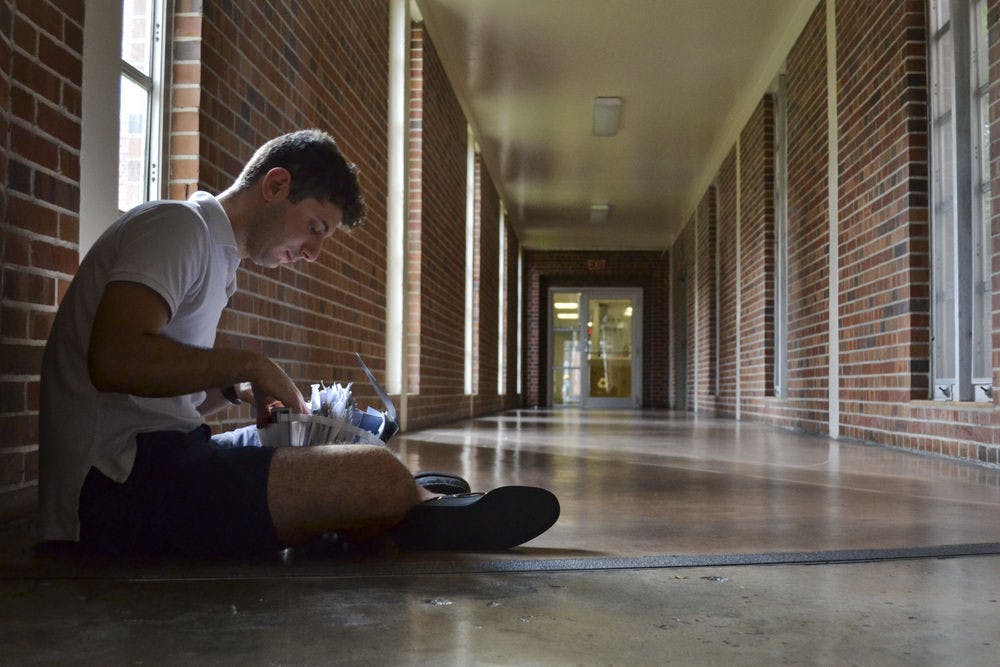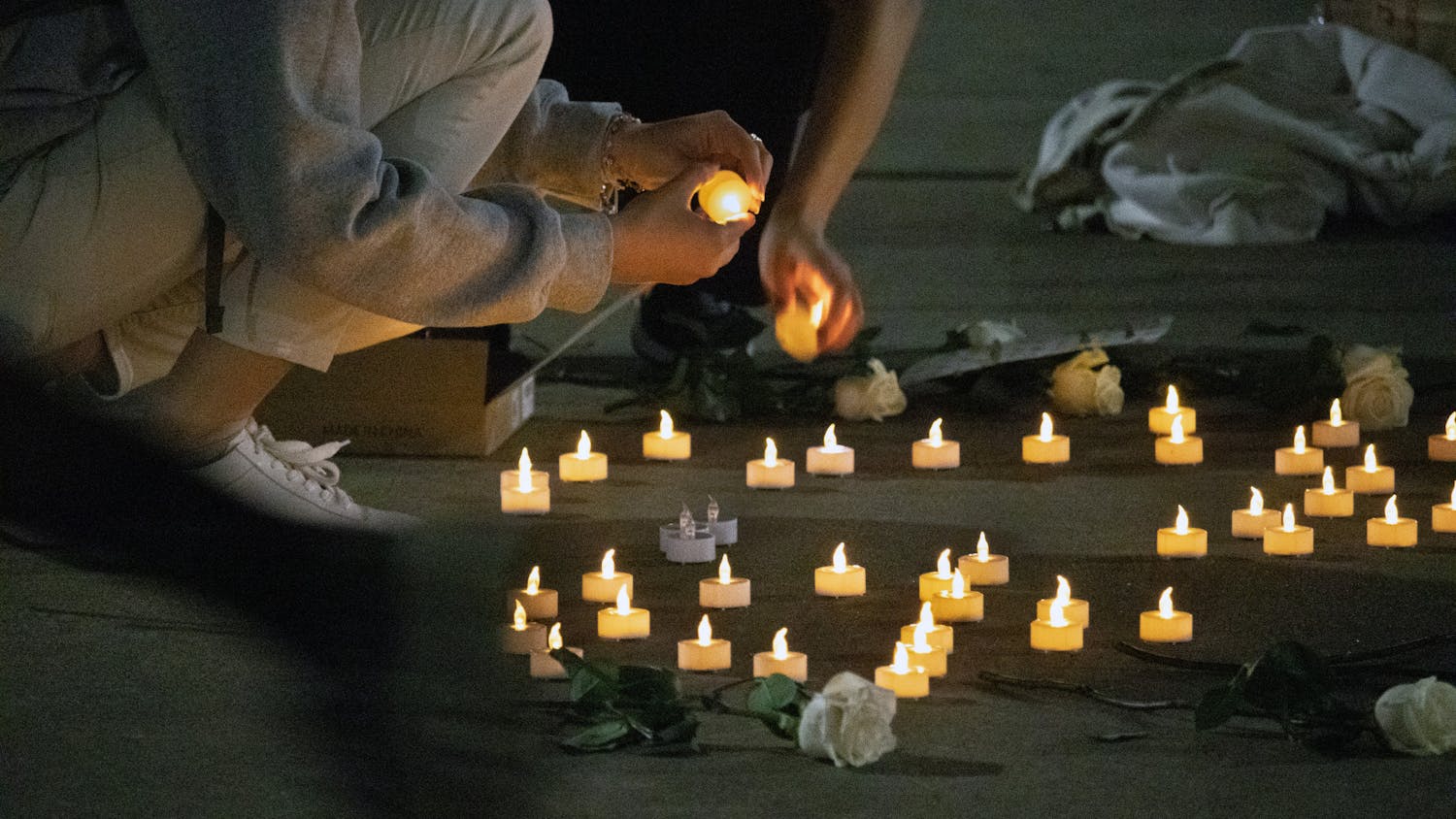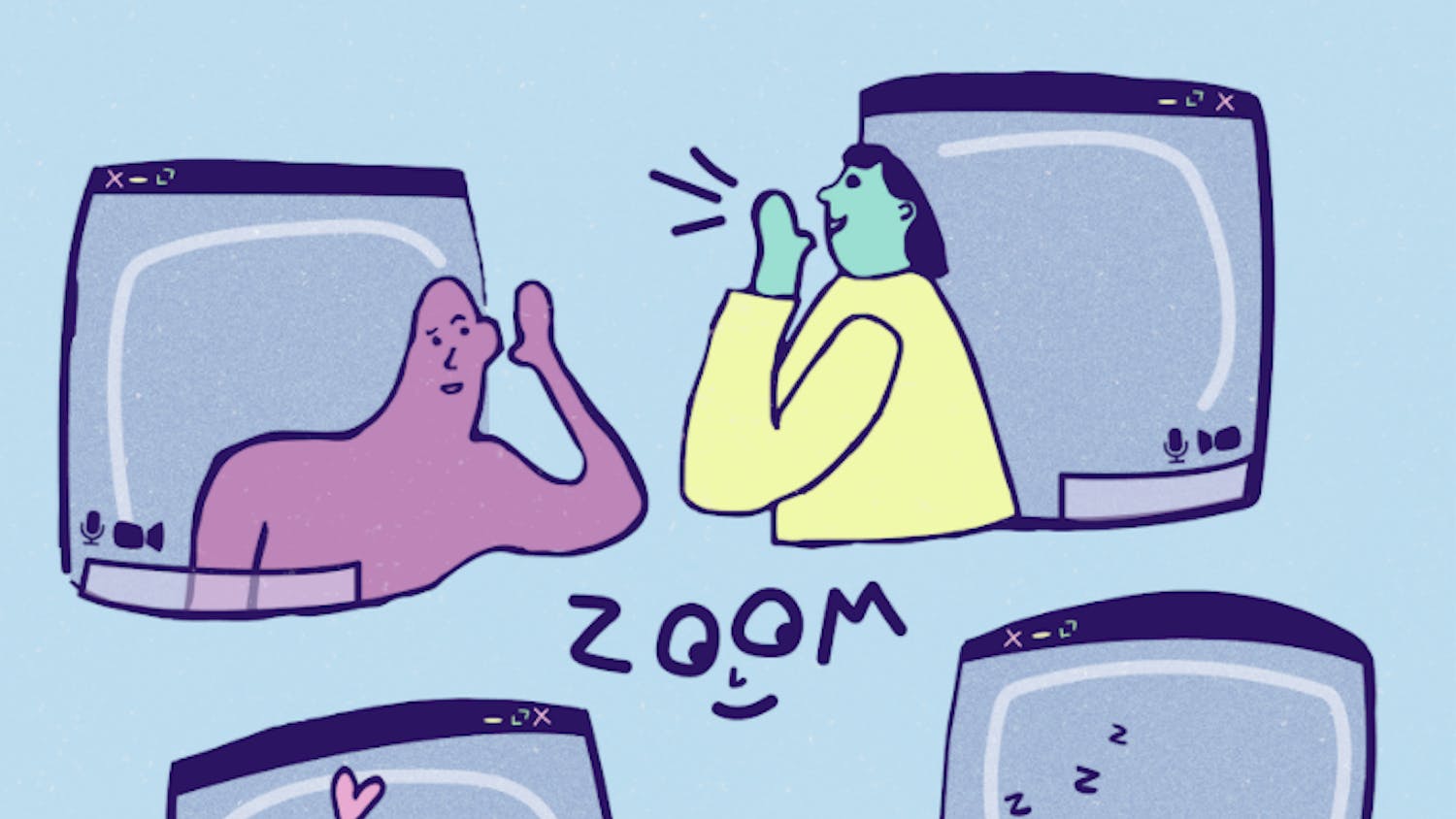Sometimes Nicholas Nourieh spends hours looking at the relics of his past life.
Past exams. An old cellphone. A letter to a kidnapped friend.
When he left Syria, the UF biology junior couldn’t take it all. He brought what he could carry shoved in a black binder, not given a chance to look back.
While Nourieh, 20, is quick to tell almost anyone about where he came from, he doesn’t elaborate on what he’s been through.
The binder, he’s only shown to his mother. The letter to his friend, he’s kept to himself.
"People don’t like hearing sad stories," he said.
Nourieh’s life wasn’t always as calm as the library he now spends most of his time in.
Years ago, as a civil war ripped a hole in his country, he struggled to hear his teacher’s voice over the boom of tanks. Now, he finds quiet in Marston Science Library to study for his organic chemistry exam.
With U.S. governors vowing to keep Syrian refugees away from their states and students becoming more cognizant of his country’s civil war, Nourieh’s memories are more tangible than ever before.
For him, they are memories of a home that has been reduced to rubble.
• • •
Nourieh was a happy child.
He grew up in Homs, a city in western Syria, with his two sisters, a brother and his parents.
He remembers playing the card game Yu-Gi-Oh with his friends when he wasn’t in school. As he grew up, he’d go out to eat around the city.
"I remember I was really happy. I remember I was really innocent," he said. "I didn’t know much about the world."
He was in his own little bubble, he said.
By the time he turned 16, however, the bubble had burst.
Before, he played pingpong and basketball, ran track and swam. But then, practicing after school became too dangerous as the Arab Spring protests made their way into Syria.
It had already forced four leaders out of office, and soon protesters were firing their weapons at the governor’s office in his city.
When a group of about 100 protesters gathered down the street from his house, waving guns and yelling against the government, his family decided to leave.
The streets were dark at 2 a.m.
"My parents wake me up and they’re like, ‘You have to pack your things. We’re going now,’" Nourieh said.
They traveled to a suburban area of Homs, temporarily safe in the hills.
But when tensions began to escalate between the government and the rebels in the latter half of 2011, Nourieh left for Damascus, the capital of Syria.
On his first day in the new city, a bomb went off in Abbasid Square in the first attack on the capital city during the young civil war.
Nourieh, by this time accustomed to the sound of explosions, hung out with a friend later that day.
"Because it was happening everywhere else in the country, so it wasn’t a surprise," he said. "Obviously I wasn’t scared because I was, like, used to it."
A few months later, when still in Damascus, a bomb was detonated near his school. The taxi he rode to class had its windows shattered.
But classes still went on.
It was the seventh explosion in a three-month period, he said.
"The more it happens," he said, "the quicker you get over it."
In Damascus, Nourieh’s mother stayed with him for a few months before she and Nourieh’s father flew to the U.S. in search of green cards.
He was 16 at the time.
"And then she left and, like, crazy shit started going down," he said.
• • •
In January 2013, his parents received their green cards.
They got into the U.S. with tourist visas, but once they arrived, they hired an attorney to help secure them immigrant visas. The status change wouldn’t have been possible if their eldest daughter hadn’t married a Syrian-American, which made her a citizen.
In less than a year, Nourieh and his other sister, who preferred not to be named, received their green cards. On Nov. 20, 2013, Nourieh flew to Jacksonville. It was his second time in the U.S.
He attended the University of North Florida for his freshman and sophomore year before transferring to UF, where he’s been for the past semester.
And while he occasionally thinks of his old life, he said he’s glad to have gotten the chance to leave a war zone.
Others weren’t as fortunate.
• • •
Nourieh’s sister still lives in the Middle East. She asked to remain anonymous.
When the violence in her country was at its peak in mid-2012, the now 23-year-old was studying business in Beirut, Lebanon.
"We kept thinking at some point we’re gonna go back to normal, we’re gonna go back to our lives," she said.
At the time, she planned to move back home.
"For a very long time, I think a lot of us were in denial of what was going on," she said. "Homs was one of the hot spots from the very beginning, and it just kept getting worse."
In 2012, she noticed violent groups flooding the streets, killing civilians based on religious conflicts and, sometimes on a whim.
When their friend was in a car accident, two of her friends ran to the scene to help.
That’s when they were killed.
"They killed a bunch of people," she said. "Two of them happened to be my friends."
She said the war in Syria changed her. She’s more emotional, less ambitious. She wants to return to her country one day, but she isn’t holding her breath.
"I never want to be hopeful again, so I’m just waiting it out," she said. "Kinda feels like there’s no point of wasting your time."
Although the circumstances weren’t ideal, she said she feels like the war brought her family together.
"I definitely didn’t want us to bond over this stuff," she said.
She still misses her family.
• • •
Last summer, Nourieh returned to Syria for the first time in three years.
He said the fighting has diminished, but the city is in shambles.
Traveling the same streets he once called his own, Nourieh saw buildings razed to the ground. To him, the city had shrunk.
He couldn’t visit his old house or walk in his old neighborhood. Of all the neighborhoods in Homs, his is the only one still occupied by rebels.
As a teenager, Nourieh had a large group of friends — about 50. Every month, there were at least four birthdays to celebrate.
"We’d go to a restaurant and literally take, like, half of the restaurant ourselves," he said. "We would do everything together."
But now, they’re scattered across the globe, driven away by conflict.
Visiting the friends that are still there, he said he sees the scars: They’re depressed, they’re stressed and their basic needs are not being met.
"In a way, nothing has changed, but at the same time their own … personalities or their own, like, psychological state is the only thing that changed," he said.
With his friends scattered to other countries, it’s become hard to maintain communication.
They have different lives now, Nourieh said.
• • •
Nourieh has moved on, but now and again he’ll remember his old life.
His focus now is studying to become a doctor, but he’ll see his sister for Christmas. And he still listens as Gov. Rick Scott and others rally to keep his people out of their states.
He said he understands their concerns, but in the end, the humanitarian side of the refugee crisis must outweigh the fear of outliers.
Only a small percentage of people coming into the country will have bad intentions, he said. Almost all refugees genuinely need help.
He said people have to look at the bigger picture.
"You’re actually doing a really good thing for most of the people coming," he said.
Contact Martin Vassolo at mvassolo@alligator.org and follow him on Twitter @martindvassolo
Nicholas Nourieh, a UF biology junior and Syrian immigrant, flips through papers that hold memories of his past childhood, lost friends and a broken home country in Graham Hall on Nov. 3, 2015. After being away for three years, the 20-year-old visited his neighborhood in Homs, Syria, last summer and found destroyed buildings and spirits.
Nicholas Nourieh cracks open a binder that no one outside of his close family has seen on Nov. 3, 2015. It contained school papers, a letter to a kidnapped friend and his old cellphone.






